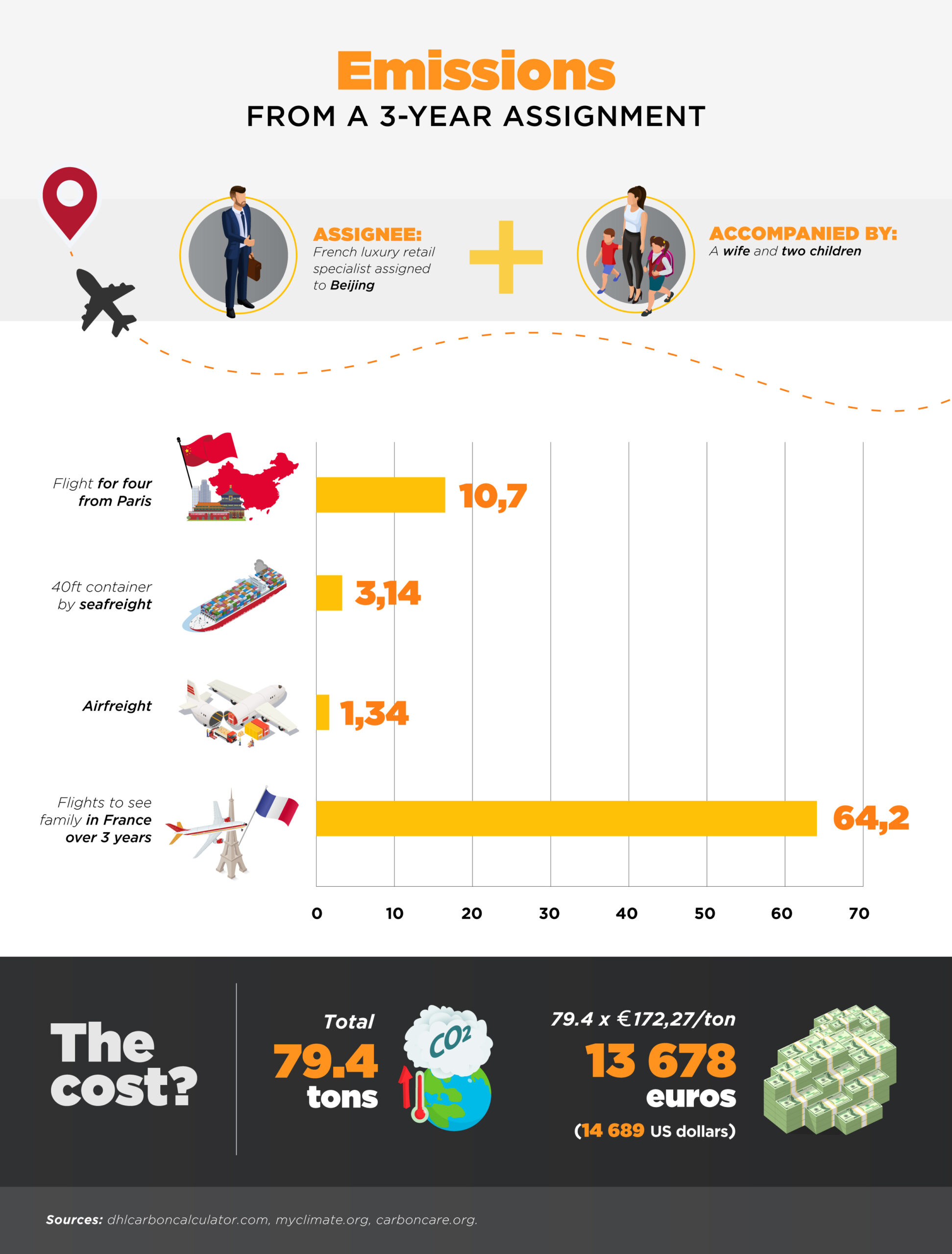
A growing number are even publishing annual sustainability reports to document their efforts.
Globally mobile, but at what cost?
With all its advantages, global mobility does come at a hefty price. To convince employees to go abroad with their families, companies need to provide certain costly incentives, such as regular flights home or the offer to move their entire lives to the destination country. As humans, we like our home comforts, and we often don’t like change. So, why not sweeten the deal and have the company pay to move your entire life – household goods and all – to your destination country?
For this, you’ll need a container. And while container ships may be the most energy-efficient shipping method, especially compared to air freight, they are not the best. Overseas shipping is responsible for 3% of worldwide emissions, and container ships are one of the biggest polluters, with many still using heavy oil.
Besides the emission of CO₂, their ballast water endangers ecosystems by releasing foreign species. Noise pollution harms wildlife in the ocean. Wastewater pollutes the ocean. And we have all seen the devastating effects of oil spills.
Climate change hits organisations in the bottom line
A study in the USA recently put a price tag on emissions: 185 US Dollars per ton of CO₂. To put it in perspective: in France, 1 ton of CO₂ emitted during transport is currently taxed at roughly 65 US Dollars/ 48 US Dollars. How much extra does this add to an assignment?
Let’s look at an expat, travelling from Paris to Beijing with their partner and two children.
A 40-foot container weighing about 10 tons, shipped from Paris to Beijing, will be responsible for 3.14 tons of CO₂ (source: dhl-carboncalculator.com). Additionally, the expat and their family need to fly to Beijing. Assuming a family of four, the flight to Beijing alone will emit 10.7 tons of CO₂ (source: myclimate.org). Now add the pollution of air freight for that distance, roughly 1.34 tons (source: carboncare.org).
On a three-year assignment, the expat and their family may travel home six times, adding another 64.2 tons (source: myclimate.org). Add the pollution for the offboarding and you have a total impact of 79.4 tons CO₂. This excludes lifestyle choices, like travelling around the host country – for work and pleasure – and buying imported treats to remind themselves of home. Plus, on top of the home comforts we mentioned earlier, there is the added excitement of furnishing a new home in a new country. Not to mention the environmental impacts on flora and fauna.
To put that into perspective: The average French person emitted 4.91 tons per year in 2019. In China, CO₂ emissions were at 7.61 tons per capita in 2019.

How emissions could affect your GM progamme
79 tons of CO₂ emissions may not sound like a lot. Especially when considering a company’s overall environmental impact. But let’s look at what this means budget-wise.
If France applies the CO₂ tax of 65 US Dollars / 48 US Dollars on flights and cargo, a company will have to factor in at least an extra 5.160 US Dollars / 3.811 US Dollars for one expat and their family. If the real price was applied – according to the US study (185 US-Dollars) – the additional costs would go up to 14.685 US Dollars.
These costs are currently borne by societies, but governments are catching up in pricing CO₂. Right now, emissions caused by shipping aren’t taxed. Both shipping and aviation industries are fighting hard against environmental taxes, but the tide is turning.
At the IMO summit in the beginning of July 2023, countries like France pushed to implement a 300 – 400 US-Dollar tax per ton of heavy oil. France has already introduced a new eco tax, taxing flights departing from French airports. In the USA, one of the biggest climate action legislations was passed and, should Democrats regain the majority in Congress and keep the White House, a carbon tax is likely the next step. Germany has introduced a CO₂ tax in 2021 and even China introduced a Cap-and-Trade System in the same year.
The legislative landscape is changing, and it is likely that within the next few years privileges for the shipping and aviation industry will shrink and eventually disappear.
Right now, GM programmes are only indirectly taxed –a fuel tax for a company car or a CO₂ tax on heating for an expat’s apartment. But as outlined above, change is on the way. And to avoid these costs sneaking up on you it’s best to start making changes now.
How can organisations decrease their emissions costs?
 Going back to our family of four, the onboarding flight, travelling home and the offboarding flight cannot be avoided during an intercontinental assignment. But there are ways to reduce the overall environmental impact of global mobility.
Going back to our family of four, the onboarding flight, travelling home and the offboarding flight cannot be avoided during an intercontinental assignment. But there are ways to reduce the overall environmental impact of global mobility.
What should be considered is the location itself. A city like Lagos, for example, isn’t ideal if you want to encourage sustainable choices. Due to a lack of public transport, expats need a car to go grocery shopping, to commute to work and for many other activities.
Paris, however, is a completely different story. With good public transport and shops in walking distance, a car is mostly just a way to be stuck in traffic. You want to go to a park? Surely, there is one nearby and if not – just hop on the metro.
How to encourage sustainability amongst your assignees?
 Alongside environmental and sustainable considerations, the expat’s needs and expectations must be considered. Building flexibility into your programme will make it easier for the expat to make sustainable choices. Especially if they’re incentivised to do so.
Alongside environmental and sustainable considerations, the expat’s needs and expectations must be considered. Building flexibility into your programme will make it easier for the expat to make sustainable choices. Especially if they’re incentivised to do so.
One option is particularly well-suited to continental assignments – especially within the European Union. If an expat is assigned from France to a neighbouring country (e.g., Belgium), a flight may not be necessary. Instead of paying expats a travel lump sum, companies may decide to pay for a train back home and offer more remote work possibilities. That way the company does not need to relocate the entire family and the expat could potentially spend more time in their home country, without having to go back and forth every weekend.
Another viable option is to encourage expats to move into a furnished apartment and cover any storage costs for their furniture in their home country. Instead of dealing with a stressful removal process, people can pack a few suitcases, get on the plane and arrive in an already ready apartment. Compare that to having to coordinate removal dates, pack, clean, stay in a hotel or two, then eventually arrive at your apartment, only to do the same when the assignment ends. Not really a tough choice.
Offer employees to take the train instead of the car and pay the train ticket instead. If the train is punctual and clean (and often faster) it beats being stuck in traffic. Time is our most valuable resource and, as you see in these examples, making sustainable choices and saving time are not mutually exclusive.
If you want to learn about best-practice, and introduce flexibility to your GM policy, contact AGS Relocation and we will be happy to assist you in any change you want to make. As an international company with locations all around the world, we bring in-depth knowledge of legislation, crucial economic factors, and valuable contacts to the table.














